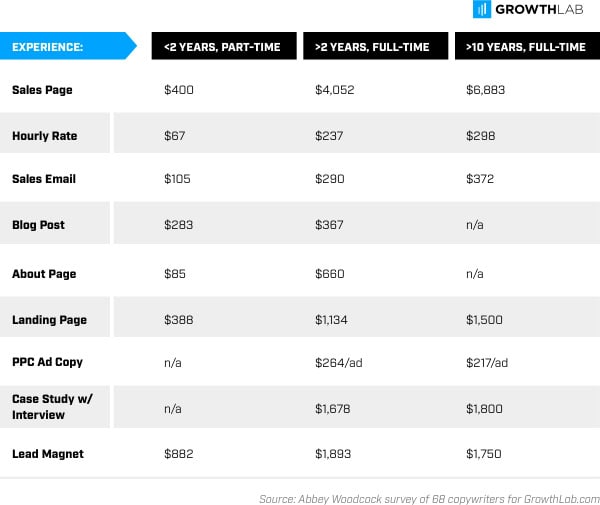Factors Influencing Your Hourly Rate as a Freelance Copywriter
Several key factors influence a freelance copywriter’s hourly rate, including experience, industry, location, and type of projects. Experience is a significant factor, as seasoned copywriters can command higher rates due to their expertise and portfolio of work. For instance, a copywriter with 10 years of experience may charge $100 per hour, while a newcomer may charge $50 per hour.
Industry is another crucial factor, as different industries have varying standards for copywriting rates. For example, technical writing and financial writing often require specialized knowledge and may command higher rates than blog writing or social media content creation. Location also plays a role, as copywriters in urban areas may charge more than those in rural areas due to the higher cost of living.
The type of projects a copywriter undertakes also impacts their hourly rate. For example, a copywriter specializing in high-end branding and marketing materials may charge more than one focused on creating content for small businesses. Additionally, the level of research and expertise required for a project can influence the hourly rate, with more complex projects commanding higher rates.
Understanding these factors is essential for freelance copywriters to set a fair and competitive hourly rate. By considering their experience, industry, location, and type of projects, copywriters can establish a rate that reflects their value and attracts high-quality clients. In the next section, we will explore how to calculate an ideal hourly rate, taking into account business expenses, taxes, and desired income.
How to Calculate Your Ideal Hourly Rate
Calculating an ideal hourly rate as a freelance copywriter requires careful consideration of several factors, including business expenses, taxes, and desired income. To determine a fair and sustainable rate, follow these steps:
Step 1: Calculate your annual business expenses, including costs such as equipment, software, marketing, and insurance. This will give you a clear understanding of your overhead costs.
Step 2: Determine your desired annual income, taking into account your personal financial goals and expenses. This will help you set a target for your hourly rate.
Step 3: Calculate your tax obligations, including self-employment taxes and any other relevant taxes. This will help you understand how much of your income will go towards taxes.
Step 4: Use the following formula to calculate your ideal hourly rate:
Hourly Rate = (Desired Annual Income + Annual Business Expenses) / (Number of Billable Hours per Year)
For example, if your desired annual income is $50,000, your annual business expenses are $10,000, and you plan to work 1,000 billable hours per year, your ideal hourly rate would be:
Hourly Rate = ($50,000 + $10,000) / 1,000 = $60 per hour
By following these steps and using this formula, you can calculate an ideal hourly rate that takes into account your business expenses, taxes, and desired income. This will help you set a fair and sustainable rate that allows you to earn a good income while also delivering high-quality services to your clients.
Industry Standards and Benchmarks for Freelance Copywriters
Understanding industry standards and benchmarks for freelance copywriter hourly rates is essential for setting a fair and competitive rate. According to the Editorial Freelancers Association, the average hourly rate for freelance copywriters in the United States is around $75-$100 per hour. However, rates can vary widely depending on factors such as experience, industry, and location.
ProBlogger, a reputable online resource for freelance writers, reports that the average hourly rate for freelance copywriters is around $50-$75 per hour. However, experienced copywriters can earn upwards of $100-$200 per hour or more, depending on the complexity of the project and the level of expertise required.
It’s also worth noting that industry standards and benchmarks can vary depending on the specific type of copywriting service being offered. For example, technical writing and financial writing may command higher rates than blog writing or social media content creation.
To give you a better idea of industry standards and benchmarks, here are some approximate hourly rate ranges for different types of copywriting services:
Blog writing: $25-$50 per hour
Social media content creation: $25-$50 per hour
Technical writing: $50-$100 per hour
Financial writing: $75-$150 per hour
High-end branding and marketing materials: $100-$250 per hour
By understanding industry standards and benchmarks, freelance copywriters can set a fair and competitive hourly rate that reflects their value and expertise. In the next section, we will explore the importance of understanding client expectations and communicating the value of your services to justify your hourly rate.
Client Expectations and How to Communicate Your Value
Understanding client expectations is crucial for freelance copywriters to communicate the value of their services and justify their hourly rate. Clients often have specific needs and goals in mind when hiring a copywriter, and it’s essential to understand these expectations to deliver high-quality work and build a strong working relationship.
To effectively communicate your value proposition, consider the following tips:
Clearly define your services and what you can offer to clients. Be specific about the types of projects you can handle, your areas of expertise, and the benefits you can bring to their business.
Highlight your unique selling points and what sets you apart from other copywriters. This could be your experience, your writing style, or your ability to understand the client’s industry and target audience.
Use language that resonates with your clients and speaks to their needs. Avoid using jargon or technical terms that may confuse them, and focus on the benefits of your services rather than just listing features.
Provide examples of your work and case studies that demonstrate your expertise and the value you can bring to clients. This could be in the form of a portfolio, testimonials, or success stories.
Be transparent about your hourly rate and the value you bring to clients. Explain how your rate is calculated, what services are included, and what clients can expect from working with you.
By understanding client expectations and communicating your value proposition effectively, freelance copywriters can build trust with their clients, justify their hourly rate, and deliver high-quality work that meets their needs.
Negotiating Your Hourly Rate with Clients
Negotiating your hourly rate with clients can be a challenging but crucial part of being a freelance copywriter. It’s essential to be prepared and confident when discussing your rates with clients to ensure you get paid fairly for your work.
Here are some tips for negotiating your hourly rate with clients:
Know your worth: Before entering into any negotiation, it’s essential to know your worth as a freelance copywriter. Research the market, understand your skills and experience, and be confident in your abilities.
Be transparent: Be open and transparent about your hourly rate and what it includes. Explain to clients how your rate is calculated and what services are included.
Be flexible: Be prepared to negotiate and be flexible with your rate. Consider offering different pricing structures or packages to meet the client’s needs and budget.
Use data to support your rate: Use data and statistics to support your hourly rate. For example, you can cite industry standards, research studies, or case studies that demonstrate the value of your services.
Be confident but respectful: Be confident and assertive when negotiating your rate, but also be respectful and professional. Remember that the client is looking for a solution to their problem, and you are there to provide it.
Some common objections to hourly rates include:
“Your rate is too high.”
“We can’t afford your rate.”
“We’re looking for a lower rate.”
When faced with these objections, it’s essential to remain calm and professional. Here are some responses you can use:
“I understand that my rate may be higher than what you’re used to, but I assure you that my services are of high quality and will provide a significant return on investment.”
“I’m happy to discuss different pricing structures or packages that can meet your budget and needs.”
“I’m confident that my rate is competitive with industry standards, and I’m willing to provide data and statistics to support it.”
By being prepared, confident, and professional, you can effectively negotiate your hourly rate with clients and ensure you get paid fairly for your work.
Maximizing Your Earning Potential as a Freelance Copywriter
To maximize your earning potential as a freelance copywriter, it’s essential to focus on finding high-paying clients, increasing productivity, and developing in-demand skills. Here are some actionable tips to help you achieve these goals:
Find high-paying clients:
Research and target high-paying industries such as finance, technology, and healthcare.
Develop a strong portfolio that showcases your expertise and experience.
Network with other freelancers and potential clients to build relationships and find new opportunities.
Increase productivity:
Use project management tools to streamline your workflow and stay organized.
Set clear goals and deadlines for each project to ensure timely completion.
Develop a routine that includes regular breaks and self-care to maintain your physical and mental health.
Develop in-demand skills:
Stay up-to-date with the latest industry trends and best practices.
Develop skills in high-demand areas such as content marketing, social media, and SEO.
Consider obtaining certifications or taking courses to enhance your skills and credibility.
By focusing on these areas, you can maximize your earning potential as a freelance copywriter and achieve success in a competitive market.
Additionally, consider the following tips to further increase your earning potential:
Offer additional services such as content strategy, editing, and proofreading.
Develop a retainer-based model to provide ongoing services to clients.
Use technology to automate tasks and streamline your workflow.
By implementing these strategies, you can increase your earning potential and achieve long-term success as a freelance copywriter.
Conclusion: Setting Yourself Up for Success as a Freelance Copywriter
Setting a fair hourly rate is a crucial step in unlocking your earning potential as a freelance copywriter. By understanding the factors that influence your rate, calculating your ideal rate, and communicating your value to clients, you can set yourself up for success in a competitive market.
Remember, your hourly rate is not just a number – it’s a reflection of your skills, experience, and the value you bring to your clients. By taking control of your rate and being confident in your worth, you can attract high-paying clients, increase your productivity, and achieve long-term success as a freelance copywriter.
As you continue on your journey as a freelance copywriter, keep in mind the following key takeaways:
Your hourly rate is a critical component of your business, and it’s essential to get it right.
Understanding your costs, including business expenses and taxes, is crucial to setting a fair and sustainable rate.
Communicating your value to clients is key to justifying your rate and attracting high-paying clients.
By following these tips and being proactive about your rate, you can set yourself up for success and achieve your earning potential as a freelance copywriter.
So, take control of your rate today and start building the successful freelance copywriting business you deserve.
Conclusion: Setting Yourself Up for Success as a Freelance Copywriter
As a freelance copywriter, setting a fair hourly rate is crucial to unlocking your earning potential and achieving success in a competitive market. By understanding the factors that influence your rate, calculating your ideal rate, and communicating your value to clients, you can set yourself up for success and achieve your financial goals.
Remember, your hourly rate is not just a number – it’s a reflection of your skills, experience, and the value you bring to your clients. By taking control of your rate and being confident in your worth, you can attract high-paying clients, increase your productivity, and achieve long-term success as a freelance copywriter.
In conclusion, setting a fair hourly rate is a critical component of a successful freelance copywriting business. By following the tips and strategies outlined in this article, you can set yourself up for success and achieve your earning potential as a freelance copywriter.
So, take control of your rate today and start building the successful freelance copywriting business you deserve. With the right mindset, skills, and strategies, you can achieve financial freedom and success as a freelance copywriter.
As you continue on your journey as a freelance copywriter, keep in mind that your hourly rate is not set in stone. It’s essential to regularly review and adjust your rate to ensure it reflects your growing skills, experience, and value to clients.
By staying proactive and adaptable, you can continue to grow and succeed as a freelance copywriter, and achieve your long-term financial goals.






